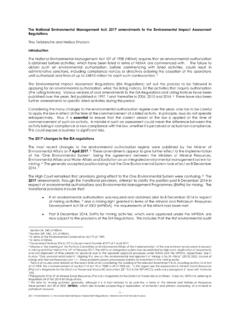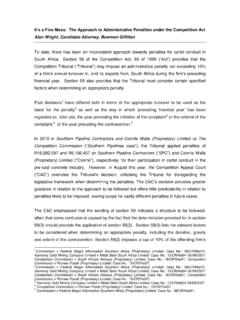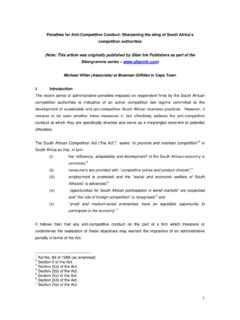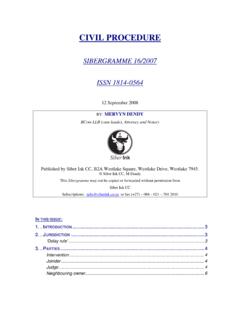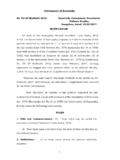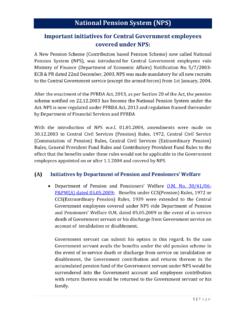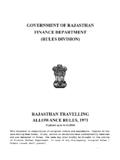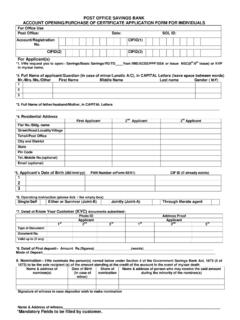Transcription of PAYMENTS ON TERMINATION OF EMPLOYMENT – A TAXING …
1 24 November 2016 PAYMENTS ON TERMINATION OF EMPLOYMENT A TAXING AFFAIR! SHELLEY WILSON & ANERIA BOUWER On TERMINATION of EMPLOYMENT , there are certain PAYMENTS that must be made to employees by the employer. Some of these PAYMENTS are required in terms of legislation while others may be required in terms of the employee s EMPLOYMENT contract. TERMINATION PAYMENTS usually include: salary until last day of work; payment in lieu of notice if the employee is not required by the employer to work his/her notice period, as provided in the EMPLOYMENT contract (and unless the employee s services are terminated summarily (without notice), typically in dismissals for gross misconduct); payment in respect of annual leave that has accrued to the employee but is untaken as at the date of TERMINATION ; and pension or provident fund benefits in terms of fund rules .
2 Other TERMINATION PAYMENTS may include, for example, a pro rata 13th cheque or bonus. This depends on whether it is company policy or practice for the employer to pay a pro-rated 13th cheque or bonus where an employee s services are terminated part way through the year. In addition, on TERMINATION for operational requirements (retrenchment), the Basic Conditions of EMPLOYMENT Act 75 of 1997 requires that an employee be paid severance pay, an additional payment of a minimum of 1 week s remuneration for every completed year of service. Remuneration is defined in the BCEA to mean any payment in money or in kind, or both in money and in kind, made or owing to the employee in return for that person working for the employer.
3 Accordingly, statutory severance pay is calculated on more than an employee s basic wage or salary. On TERMINATION , many employers simply deduct income tax in the ordinary course from the lump sum payment due to the employee (made up of, for example, salary, notice pay and accrued leave pay and perhaps severance pay and/or a gratuity), remit the income tax to the South African Revenue Service ( SARS ), and pay the balance to the employee. This is actually in contravention of the Income Tax Act 58 of 1962 ( ITA ) and may result in the employer facing an additional tax bill. Paragraph 9(3)(a) of the Fourth Schedule to the ITA provides that the amount to be deducted or withheld in respect of employees tax from any lump sum to which paragraph (d) or (e) of the definition of gross income in the ITA applies, shall be ascertained by the employer from SARS before paying out the lump sum.
4 Paragraphs (d) and (e) of the definition of gross income in the ITA deal with PAYMENTS to an employee on TERMINATION of EMPLOYMENT , including voluntary TERMINATION , for purposes of taxation. 1. In terms of paragraph (d)(i), the following is included in an employee s gross income any amount .., including any voluntary award, received or accrued (i) in respect of the relinquishment, TERMINATION , loss, repudiation, cancellation or variation of any office or EMPLOYMENT or of any appointment .. to any office or EMPLOYMENT ; .. 2. In terms of paragraph (e), the following is also included in an employee s gross income - a retirement fund lump sum benefit or retirement fund lump sum withdrawal benefit.
5 The effect of paragraphs (d) and (e) of the definition of gross income is that, with limited exceptions, all lump sum TERMINATION PAYMENTS , including so-called ex gratia or gratuity PAYMENTS made to an employee in consequence of an agreed resignation or mutually agreed TERMINATION , are subject to income tax. Therefore, the normal procedure where a lump sum is to be paid to an employee on TERMINATION of her EMPLOYMENT is that a tax directive must be obtained from SARS by the employer prior to paying the lump sum amount to the employee (in terms of the employer s statutory obligation), and the employer deducts income tax from the amount to be paid to the employee in accordance with the tax directive obtained.
6 Tax exemptions One of the benefits to applying for an income tax directive from SARS is that certain benefits payable to employees on TERMINATION of EMPLOYMENT are subject to a cumulative tax exemption and to more attractive tax rates. With effect from 1 March 2014: any retirement fund lump sum benefit and/or any severance benefit received by or accrued to an employee upon TERMINATION of EMPLOYMENT will qualify for a once-off R500,000 tax exemption, while the amounts in excess of R500,000 will be taxed at lower rates than provided for in the normal SARS tables; and while a retirement fund lump sum withdrawal benefit also qualifies for an exemption and special tax rates, this is much less attractive with only the first R25,000 of a retirement fund lump sum withdrawal benefit qualifying for an exemption.
7 A retirement fund lump sum benefit generally refers to a retirement fund lump sum payable on retirement, while a retirement fund lump sum withdrawal benefit refers to a withdrawal benefit payable on TERMINATION of EMPLOYMENT prior to retirement. It is much more beneficial for employees in the latter instance to have their withdrawal benefits transferred to another retirement fund or to a preservation fund (which transfer should not trigger any tax), rather than to take it in cash and be taxed on it. A severance benefit is defined to mean any amount (other than a lump sum benefit ..) received by or accrued to a person by way of a lump sum from or by arrangement with the person s employer.
8 In relation to that employer in respect of the relinquishment, TERMINATION , loss, repudiation, cancellation or variation of the person s .. EMPLOYMENT .., if- (a) such person has attained the age of 55 years; or (b) such relinquishment, TERMINATION , loss, repudiation, cancellation or variation is due to the person becoming permanently incapable of holding the person s office or EMPLOYMENT due to sickness, accident, injury or incapacity through infirmity of mind or body; or (c) such TERMINATION or loss is due to- (i) the person s employer having ceased to carry on or intending to cease carrying on the trade in respect of which the person was employed or appointed.
9 Or (ii) the person having become redundant in consequence of a general reduction in personnel or a reduction in personnel of a particular class by the person s employer, .. The favourable tax treatment in respect of severance benefits thus only applies on TERMINATION of EMPLOYMENT - in respect of a lump sum retirement fund withdrawal accrued from a retirement fund ; or if the employee is 55 or older; or if the TERMINATION is due to incapacity; or if the TERMINATION is due to the employer ceasing to carry on trade, or the employee becoming redundant. The following tax rates are now applicable to retirement fund lump sum benefits and severance benefits.
10 Taxable income from retirement fund lump sum benefits and from severance benefits Rate of tax R500,000 or less 0% of taxable income R500,000 - R700,000 18% of taxable income above R500,000 R700,000 - R1,050,000 R36,000 + 27% of taxable income above R700,000 R1,050,000 + R130,500 + 36% of taxable income above R1,050,000 It must be kept in mind that the above rates and thresholds apply over the person s lifetime should an employee have received retirement fund lump sum withdrawal benefits and/or severance benefits previously, such amount(s) would have to be taken into account to determine whether the current payment will be exempt or will be subject to the 18%, 27% or 36% rates as set out in the table.

